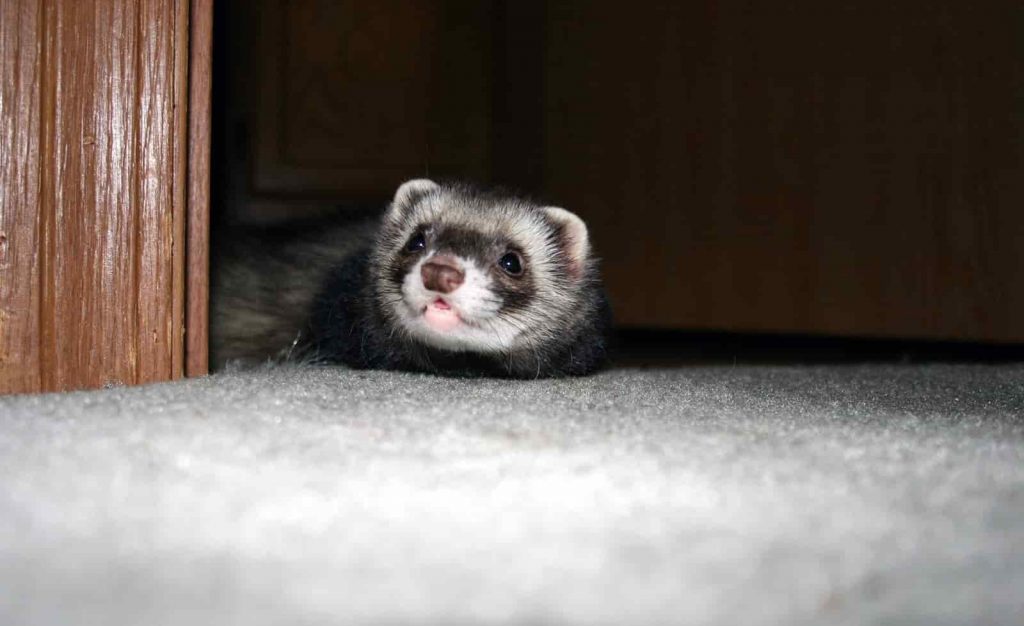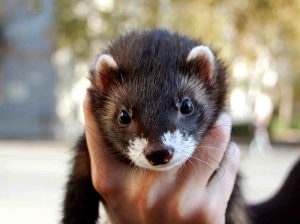Last updated on March 18th, 2023 at 04:42 pm

Ferrets are really cute, and if you own one, it is a brainer. They are intelligent, active, quiet, and mischievous sometimes. If you own a ferret, you might have some questions about their eyesight and how they navigate in dimly lit rooms. Typically, ferrets are active at certain times of the night. However, there is a misconception that they have poor eyesight and can only see in the dark. Ferret owners should understand their pets to have a good long-lasting relationship. If you are reading this article, you must be curious, and I am here to help.
Can ferrets see in the dark?
Ferrets cannot see well in the dark. In fact, they have a serious problem seeing in the dark or adapting to the sudden brightness. Therefore, ferrets prefer thriving in low-light conditions because they work best for their eyes. Research shows that ferrets are not nocturnal animals (they cannot see in the dark). However, they have a tapetum lucidum i.e., a reflective tissue layer in their eyes to help amplify light. Therefore, whenever ferrets’ eyes are exposed to light, they shine.
It is important to note that the tapetum lucidum in ferrets works differently. Unlike humans, this tissue layer reflects light a second time via the retina, blurring the image. It is, therefore, safe to say that ferrets do not see clearly as humans do. With the help of the shining tissue layer. Your pet friend can amplify any present light. Light amplification helps ferrets see shapes and movements better in low-light environments. When the light is too low, there is limited light, and the reflective layer cannot reflect much. That’s one of the main reasons ferrets do not see well in the dark or at night.
What is the glow in a ferret’s eye?
Tapetum lucidum is present in the deep sea and in nocturnal animals. You can find this reflective layer in cats, dogs, and horses. If you are keen, you must have noticed that these animals’ eyes glow in the dark. The glow can vary depending on the animal. Research shows that the same applies to ferrets.
The shining layer (Tapetum lucidum) reflects light making their eyes glow. You can see the glow in a ferret’s eyes in low light or if you photograph them with a flash camera. Interestingly, ferrets’ eyes glow differently depending on the species, colors of the eyes, and age.
According to officialgoldenretriever.com, if you have an albino ferret, your eyes will see a mix of green and pink colors. However, if a ferret has maroon and blue eyes, their eyes will glow red. Ferrets with brown eyes have a mix of green and yellow when their eyes glow.
Do ferrets have good eyesight?
Ferrets have binocular vision. With binocular vision, ferrets’ eyes are closer to the side of their head, making it difficult to see some objects. Sometimes, ferrets have a blind spot just in front of them.
The second thing you should note is that your pet has a depth perception problem. What are depth perception problems? In simpler terms, ferrets cannot see things that are far away. Ergo, their sight is unreliable at night or with bright light.
The third and final thing you should know to understand ferrets’ eyesight is their color perception. Unfortunately, ferrets can only see objects in red color! All the other colors appear gray, which is very hard for your pet friend to distinguish. The good thing about their binocular vision is the ability to see close objects clearly.
When do ferrets have the best vision?
Ferrets are crepuscular in nature. Therefore, they have their best vision at dusk or dawn. Ferrets are active at dusk or dawn because they can clearly see without straining. The horizontally slit pupils are crucial in helping detect edges and surfaces in low-light places.
Ferret owners should try to ferret-proof their homes to protect their pets. As we discussed earlier, ferrets cannot see far, and to see objects on the side, they must turn. Therefore, your pet friend will trip or hurt himself. Let me explain it like this for you to understand when your pet friend looks at your face, he only sees something resembling a face. He might not see your nose, ears, and other features. However, he can clearly see the surface and edges. Now imagine what he sees when he looks at a dining table or chair?
Poor eyesight is not a problem with ferrets because their nearsighted abilities are excellent. This means your pet can only see objects that are near clearly. When they combine their nearsighted abilities with other senses, for example, sense and smell, they can get mischievous. Ferrets are known to be very active, and they can cause mayhem. Are you wondering how they can achieve that, and they cannot see clearly in the dark and during the day? They sleep 14 to 18 hours daily and get active during twilight hours! If you are not keen, they can mess up your home in a few hours!
Over the years, ferrets have evolved to adapt their sight accordingly. Since they work well during twilight hours, they prefer sleeping most of the day and becoming active at dawn or dusk. If you have adopted a ferret friend, you will notice that they will get used to your routine. Therefore, they can become active after you go to bed or wake up because they want to be fed or given treats.
In the wild, ferrets are very active during twilight hours, mating, burrowing, or foraging. This does not mean that they cannot become active during the day. If there is a need, for example, to forage or mate, ferrets rely on other senses, such as hearing, sense, and smell, to operate.
Did you know that ferrets have excellent hearing ability? Ferrets can clearly define the direction and distance of a sound source! According to recent research, ferrets have vast hearing receptors in their ears to help them understand their surroundings. In the wild, a ferret can detect and hear a predator approaching.
What should you do as a ferret owner? Now that you understand how sensitive a ferret is, it is crucial to create a conducive environment. One of the things you should do is place their cages away from loud and noisy areas. They prefer quiet and dimly lit areas where they can sleep or go on their business undisturbed. You can also stop playing loud noises to help your pet friend relax during the day. If you have kids, advise them not to disturb your pet friend unnecessarily.
Final Thoughts
We have clearly determined that although ferrets cannot see in the dark, they can see clearly in low-light conditions. They are clearly unique from other animals, but over the years, they have developed other remarkable senses to navigate the environment. Ferrets can find mates, food and escape predators using their sense of smell and hearing. As a ferret owner, you should play your role to protect your furry friend. Since they have poor depth perception, ferrets are prone to falling and hitting objects. It is your responsibility to ensure they do not climb on objects. Also, you should install ramps and accessories in and around their cages to help them access everything easily.
Are you worried your ferret does not recognize you? Do not worry because they rely on their excellent sense of smell to identify and mark territory. With these senses, ferrets can recognize their owners, other ferrets, foods, and objects. Always be on the lookout and try to understand your ferret. With this knowledge, you will better care for your pet friend.


